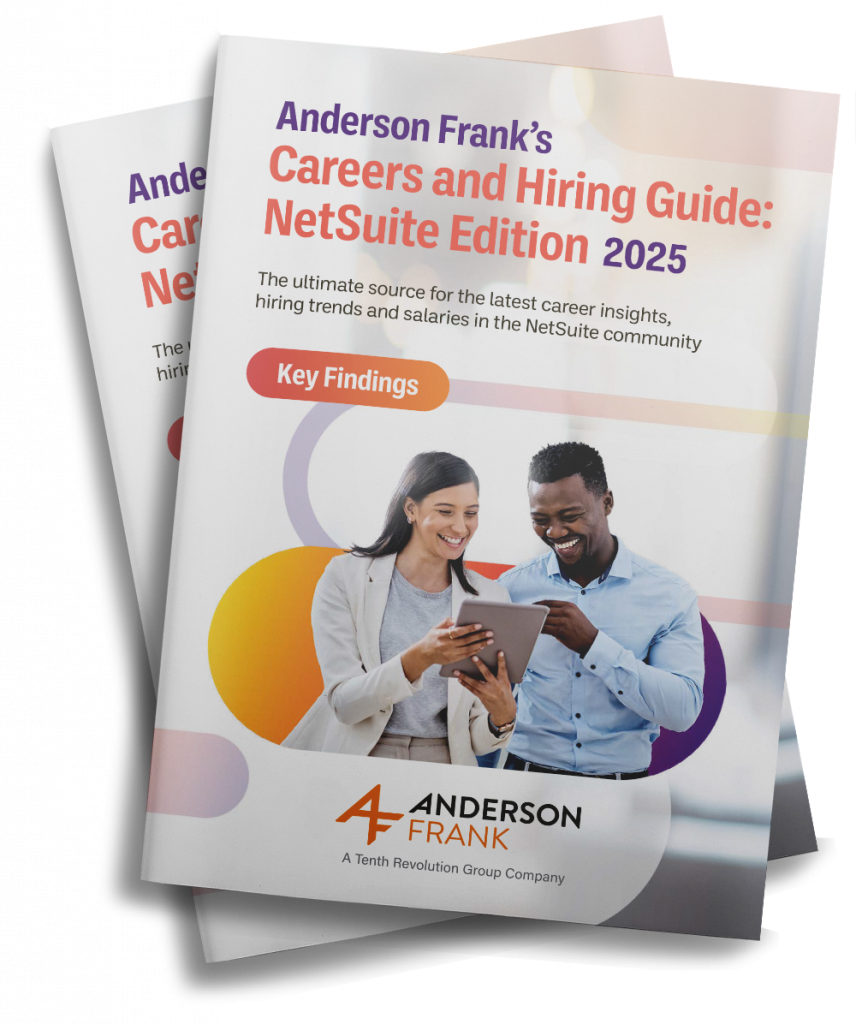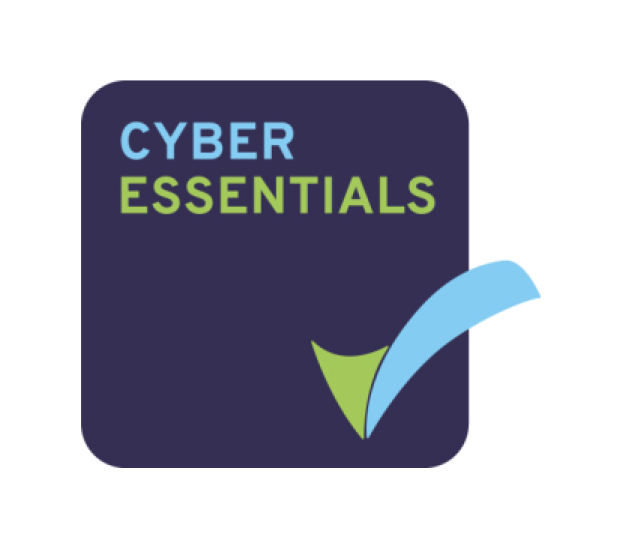Insights for hiring managers
Whatever the NetSuite role, use our guide to benchmark your salary, or to uncover what you should be paying employees in your team.

While the demand for NetSuite professionals continues to increase, the pool of talent sometimes feels like it’s remained the same size. That makes the search for top candidates even tougher, when the need has never been greater.
Little wonder, then, that organizations are taking a more strategic approach than ever before. Gone are the days where the highest bidder wins as we’re living in an era where jobseekers are looking for a package that more closely aligns with their own values, identity and ambition.
Of course, that’s not to say that retention hasn’t continued to play a vital role in any successful hiring strategy—after all, it’s no use attracting staff if the building blocks aren’t there to keep them.
What strategies are employers using to stay competitive in attracting talent?
| Employee skills training | 56% |
| Employee wellbeing initiatives | 42% |
| Introduction of a bonus (monthly/bi-annual/year-end bonus) | 40% |
| Salary increases | 37% |
| Investment in training programs | 35% |
| Company profit sharing | 32% |
| New ways of working—including remote, hybrid, or flexible working | 31% |
| Equality, diversity and inclusive hiring practices | 28% |
| Increased leadership visibility | 27% |
| Engaging employees around the mission, vision, and values of the organization | 25% |
| Increased benefits and perks | 24% |
| Developing a business case for more resources | 21% |
| Environmental, social, and governance (ESG) policy | 20% |
| None of the above | 11% |
| Other | 1% |
Hiring NetSuite professionals
Hiring managers tell us that, on average, it takes seven months to find a new NetSuite hire. And 44% of hiring managers told us they are looking to hire a NetSuite professional in the next 12 months. More than two-thirds (69%) are confident they can find the right candidate at the first attempt, while 12% are not confident.

What are your top tech staffing challenges over the next 12 months?
| Lack of resource/capacity in-house | 36% |
| Lack of skills/experience in the market | 30% |
| Increased competition for talent | 27% |
| We struggle to pay the market rate/what candidates demand | 25% |
| Lack of skills in-house | 23% |
| Buy-in from senior leadership on the need to recruit | 21% |
| Managing remote employees | 19% |
| Talent attraction | 18% |
| Talent retention | 18% |
| An increase in demand for contractor/freelancers | 16% |
| Personnel change (e.g., redundancies, restructure, and role changes) | 13% |
| Disengaged employees | 8% |
| Our current training program is not effective in upskilling inexperienced candidates | 8% |
| We struggle to identify the skills we need/lack | 7% |
| Virtual recruiting | 3% |
| Not sure | 6% |
| Other | 2% |
| Lack of resource/capacity in-house | 36% |
| Lack of skills/experience in the market | 30% |
| Increased competition for talent | 27% |
| We struggle to pay the market rate/what candidates demand | 25% |
| Lack of skills in-house | 23% |
| Buy-in from senior leadership on the need to recruit | 21% |
| Managing remote employees | 19% |
| Talent attraction | 18% |
| Talent retention | 18% |
| An increase in demand for contractor/freelancers | 16% |
| Personnel change (e.g., redundancies, restructure, and role changes) | 13% |
| Disengaged employees | 8% |
| Our current training program is not effective in upskilling inexperienced candidates | 8% |
| We struggle to identify the skills we need/lack | 7% |
| Virtual recruiting | 3% |
| Not sure | 6% |
| Other | 2% |

Hiring manager at an end user?

Hiring manager at a NetSuite Partner?
Are NetSuite professionals experiencing burnout?
According to our respondents, what were the main reasons they experienced burnout?
| Overwhelming workload | 30% |
| Insufficient autonomy/feeling a lack of control over job tasks, workload, and decision-making | 15% |
| A lack of clarity around expectations and job responsibilities | 10% |
| Challenges maintaining a healthy work-life balance | 9% |
| Toxic work culture | 8% |
| Lack of support from colleagues or management | 7% |
| Unreasonable working hours | 5% |
| A lack of complexity and variety in my work | 4% |
| Perceived unfairness in my organization (e.g., bias, favoritism, or unequal compensation) | 3% |
| Conflict with superiors or management | 2% |
| Interpersonal conflicts with colleagues | 2% |
| Inadequate recognition or rewards for contributions | 2% |
| Other | 4% |
| Overwhelming workload | 30% |
| Insufficient autonomy/feeling a lack of control over job tasks, workload, and decision-making | 15% |
| A lack of clarity around expectations and job responsibilities | 10% |
| Challenges maintaining a healthy work-life balance | 9% |
| Toxic work culture | 8% |
| Lack of support from colleagues or management | 7% |
| Unreasonable working hours | 5% |
| A lack of complexity and variety in my work | 4% |
| Perceived unfairness in my organization (e.g., bias, favoritism, or unequal compensation) | 3% |
| Conflict with superiors or management | 2% |
| Interpersonal conflicts with colleagues | 2% |
| Inadequate recognition or rewards for contributions | 2% |
| Other | 4% |
What are the consequences of experiencing burnout for our respondents?
Increased irritability, anger, or frustration
| Imbalance between work and personal life | 35% |
| Changes in weight, either loss or gain | 33% |
| Mental health challenges like depression, anxiety, or chronic stress | 22% |
| Feelings of sadness (though not clinically diagnosed as depression) | 20% |
| Difficulty with cognitive functions like memory, concentration, or decision-making | 20% |
| Physical health issues such as headaches, high blood pressure, or gastrointestinal problems | 18% |
| Strained relationships with family and friends | 15% |
| Greater reliance on alcohol or other substances | 10% |
| Imbalance between work and personal life | 35% |
| Changes in weight, either loss or gain | 33% |
| Mental health challenges like depression, anxiety, or chronic stress | 22% |
| Feelings of sadness (though not clinically diagnosed as depression) | 20% |
| Difficulty with cognitive functions like memory, concentration, or decision-making | 20% |
| Physical health issues such as headaches, high blood pressure, or gastrointestinal problems | 18% |
| Strained relationships with family and friends | 15% |
| Greater reliance on alcohol or other substances | 10% |
How is employee burnout impacting organizations?
| Reduced productivity and output at work | 45% |
| Apathy, diminished morale, and decreased enthusiasm for work and the workplace | 35% |
| Lack of creativity in tasks, including generating innovative ideas | 26% |
| Presenteeism (i.e., being physically present at work but not fully productive) | 23% |
| Leaving the organization/increased turnover | 18% |
| Rise in absenteeism (e.g., needing more sick days) | 15% |
| Increased errors in tasks | 13% |
| Heightened tension and conflicts with colleagues | 13% |
| Decreased customer satisfaction | 9% |
| Other | 5% |
LinkedIn poll
NetSuite professionals gave the following reasons for working overtime*. With 30% of our survey respondents telling us that an overwhelming workload resulted in them suffering from burnout, employers need to address workload management and implement strategies to support employee well-being to prevent overworking resulting in burnout.
Conclusion
Managing NetSuite talent requires more than just technical nous and a business mind at the helm. With the effects of burnout so clear to see, managing a team properly in a way that puts employee wellbeing front and center isn’t just the right thing to do on a human level, but it’s essential to your digital talent strategy.
Indeed, it can be argued that your strategic brilliance depends entirely on having a team who are as motivated to achieve those successes as you, as well as physically and mentally able to. Burnout isn’t just harmful to humans, but it can be fatal to your own organization’s ambitions.
The future workplace
Are NetSuite professionals happy to work in the office five days a week?

Are other employers offering remote working opportunities?
Hiring remote employees
Almost two-thirds (65%) of hiring managers have hired a remote NetSuite professional in the last three years.
How well are remote employees performing?
The future of work
As the spectacle of the pandemic shrinks further behind in the rear view mirror, opinions on remote work remain interesting. Remember those opinion pieces three years ago about how our offices would look now? Very few of the more far-fetched predictions have come to really materialize.
What has happened, though, is that remote work has remained a key motivator for those looking at their next opportunity—with less than a quarter of professionals wanting to be office-based five days a week and hiring managers overwhelmingly reporting that working from home aids hiring and retention.
The reasons someone might want to work from an office are almost as infinite as the reasons another person might not, which suggests the most important thing to offer is flexibility. That means offering benefits that suit both parties, as well as facilitating a culture where remote and in-person employees can work together without restriction on their day-to-day activity or long-term career prospects.
Insights from currently unemployed NetSuite professionals
What factors that are important to unemployed professionals when seeking a role?
How likely are unemployed professionals to accept a role that involves working in the office five days a week?
Our key findings report contains highlights from this year’s Careers and Hiring Guide, plus our salary tables allow you to compare your salary or benchmark your teams’ salaries no matter their role in the NetSuite ecosystem.





